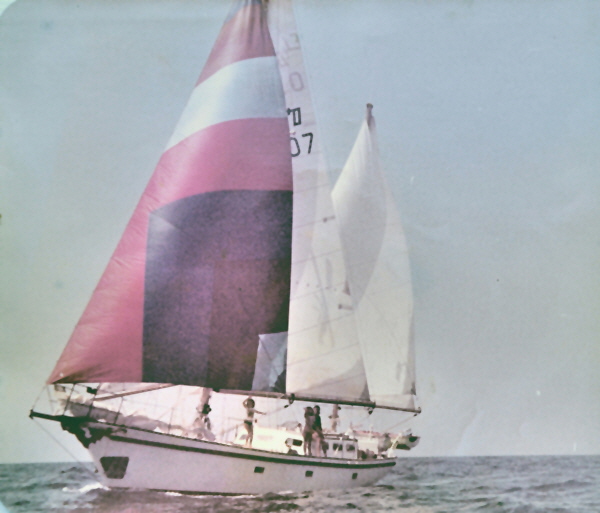THE DREAM BEGINS.
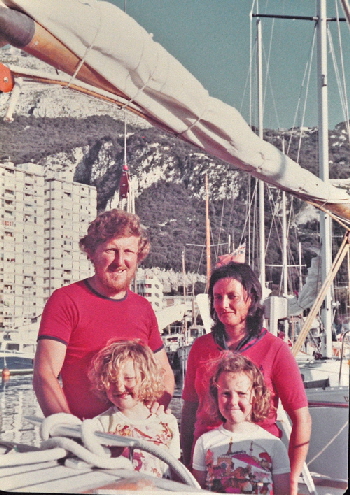 Our daughters Samantha and Sallyanne were only six and seven at the time, and like myself had never set foot on a sailing boat before, that was until we all gingerly boarded a 35’ foot Coronado ketch in Piraeus, Greece. With my husband Roger we were on an extended vacation from England, having driven to Greece in a small camper van. Here we decided to charter a sailboat for a week to visit the Islands. “You won’t have to actually do anything,” we were told,“because two crewmen come with the boat. That was why we chose that boat, because none of us had the slightest idea how to sail. Our crew were two yound Americans who slept on deck because there was no room below.
Our daughters Samantha and Sallyanne were only six and seven at the time, and like myself had never set foot on a sailing boat before, that was until we all gingerly boarded a 35’ foot Coronado ketch in Piraeus, Greece. With my husband Roger we were on an extended vacation from England, having driven to Greece in a small camper van. Here we decided to charter a sailboat for a week to visit the Islands. “You won’t have to actually do anything,” we were told,“because two crewmen come with the boat. That was why we chose that boat, because none of us had the slightest idea how to sail. Our crew were two yound Americans who slept on deck because there was no room below.
We all had an absolutely marvelous time, day sailing between islands, then mooring for the night at some pretty little villages and dining late in waterfront estiatorio’s. The water was so amazingly clear and blue and everyone could swim, and by the time we left both our girls were like mermaids. Roger was in his element as well, soaking up everything the two crew could tell him, although where that came from I don't know. We lived near Nottingham in the Midlands of England that is not renowned for its nautical heritage. More for a certain outlaw called Hood.
It was during the long drive home that Roger first mentioned what was obviously on his mind. “You know all those boats we tied up next to, and how many of them were Brit’s, living on them?” He seemed to be choosing his words more carefully than usual, and not actually looking at me, that I assumed was because he was driving. “What would you think about us doing that for a while?”
Our small business was doing well and we employed four salesmen. We had a nice house in the country, the kids went to a private school driven there by Roger in his V12 Jaguar E-type, or by me in my mini countryman, and we had a beautiful snow-white Samoyed called Dougal. So why would we put all that in jeopardy to uproot and swan-off on a tiny boat to goodness knows where? I had considerable concerns about the children's safety, and what about their education? I put it all down to a middle age crisis that must have come early, because Roger wasn't yet middle aged. But then there was the “Greek experience.” Whatever caused it, we went and actually did it.
FULFILLMENT.
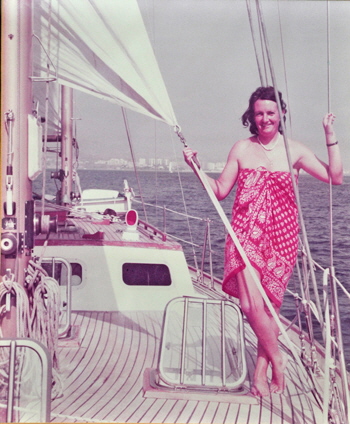 It took two years to find a buyer for our business, then sell our house, along with all our furniture and cars. We had to do it that way to be able to amass enough money to buy a decent boat and enough left over to live on. Everyone, including both our parents and friends , thought we were crazy to give up what we had worked so hard to achieve, but then they knew less about sailing than we did. Teachers at the girls school were much more supportive and suggested ways I could continue their education with correspondence courses and books. laptops and the internet had yet to be invented.
It took two years to find a buyer for our business, then sell our house, along with all our furniture and cars. We had to do it that way to be able to amass enough money to buy a decent boat and enough left over to live on. Everyone, including both our parents and friends , thought we were crazy to give up what we had worked so hard to achieve, but then they knew less about sailing than we did. Teachers at the girls school were much more supportive and suggested ways I could continue their education with correspondence courses and books. laptops and the internet had yet to be invented.
Roger went on a weeks sailing course in the North Sea and I learned celestial navigation at a local community college because satellite navigation had not yet been invented either. Roger bought me a sextant for my birthday. Oh! What wife doesn't want a sextant for her birthday? But I still cherish it because it represents the beginning of a great lifelongadventure.
We found a two-year-old well equipped Endurance 40 ketch on the River Seven near Bristol. It had three cabins, a saloon and a separate little galley. This meant the girls could at least have their own rooms. The boat didn't even have a name, so we called her “Tranquility Base,” because we were sure if the Americans could get to the moon, we ought 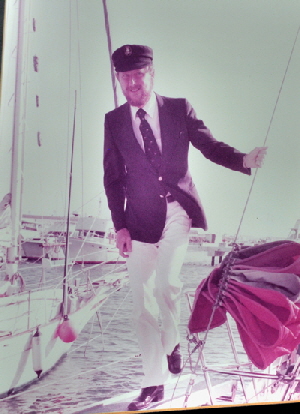 to be able to get to the Mediterranean.
to be able to get to the Mediterranean.
We lugged a van-load of belongings to the boat, including four bicycles. It certainly seemed like everything except the kitchen sink, but then I wanted to make this dramatic life change as little disruption as possible, especially for our girls. I remember they had three teddy bears each! Yes, we were very naive in those days about what was needed or what could even be stowed on a forty footer. Finally, with the help of a professional skipper we sailed round Lands End to Falmouth, where “TB” was one of the largest boats on the moorings. We stayed there for a summer and the girls went to Flushing village school. The Flushing/Falmouth ferry picked them up and dropped them back at the boat every school day. Passengers on the ferry sometimes gave us quit stern looks, but some also gave use envious looks.
It was the year of the Queen’s silver Jubilee and she came into Falmouth on the Royal Yacht Britannia. So along with other boats in the harbour we dressed ship for the occasion. Some of the girls friends also came to visit, making their transition a little easier. Quite what they reported to their own parents when they got home I can only imagine.
We all learned how to sail in Falmouth harbour and the surrounding coast and how to live together in very close proximity, that was not always congenial. We joined the prestigious Royal Cornwall Yacht Club and received a warrant to fly the blue ensign, a very distinctive flag having the heraldic feathers of Charles, Prince of Wales, the club commodore embroidered on it.
OUTWARD BOUND
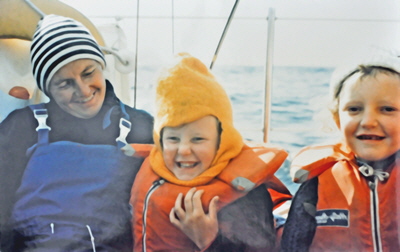 Finally, on a cold November morning and with considerable trepidation we pointed Tranquility Base's bow south, leaving old England by the lee and sailed southward to cross the Bay of Biscay. It was our first ocean passage and the first time we had all actually been at sea at night on our own. We had 500 miles in front of us across one of the most unpredictable Atlantic sea areas.
Finally, on a cold November morning and with considerable trepidation we pointed Tranquility Base's bow south, leaving old England by the lee and sailed southward to cross the Bay of Biscay. It was our first ocean passage and the first time we had all actually been at sea at night on our own. We had 500 miles in front of us across one of the most unpredictable Atlantic sea areas.
It took a few days before we settled down to a routine, and I kept a reasonable school regime with the girls using the books we had bought on recommendations of their teachers. They went to bed normally as Roger and I kept night watches, four hours on, four off, sleeping on the saloon couch. They woke in the morning usually asking, “Are we there yet?”
In the middle of Biscay, 200 miles from the nearest land, TB was rolling down a big following sea when we heard loud whooshing noises. Suddenly a large pod of porpoises leapt out of the steep waves either side of us, and some so amazingly close we could almost touch them. Porpoises are much bigger than the dolphins we had become accoustomed to seeing elsewhere. Some had small calves and it was not just our own calves who were totally enchanted. As they leapt out of the waves they looked at us and seemed to smile, saying “Welcome to our world.”
On many subsequent night passages I looked up at a bright full moon in a dark sky amid a million stars of The Milky Way as only a night at sea can produce, and I was sure I saw Mar Tranquilitas wink down at me.
For a long time the sailing curve remained almost vertical for everyone, but we tried hard to make it as smooth and every day normal for our daughters. We once ran out of diesel fuel at sea and had a long slow worrying sail back to land. But the girls just thought it was much nicer, not having the noisy engine on and listening to the water as it swooshed past their beds.
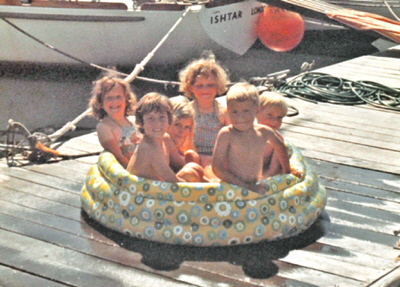 Eventually we arrived in Gibraltar, the British enclave at the tip of Spain where we intended to make our base, but with no other specific plan in mind.
Eventually we arrived in Gibraltar, the British enclave at the tip of Spain where we intended to make our base, but with no other specific plan in mind.
I enrolled the girls in the superb convent school, perched half way up the Rock with breathtaking views overlooking the Straits of Gibraltar, with Europe to the north and mysterious Africa to the south. I was a little concerned the nuns might try to proselytize our daughters young minds, but Sister Ann the Irish headmistress set my mind squarely at ease, “Don't yu worry now Mrs. Hughes, we don't go shovin’ it down der troughts!” There were indeed many other children of different nationalities and religions at the school and some lived on boats in the marina. Our girls quickly made just as many friends as they had in England, and it didn't take long before they were both jabbering away in Spanish, weith a little Moroccan as well.
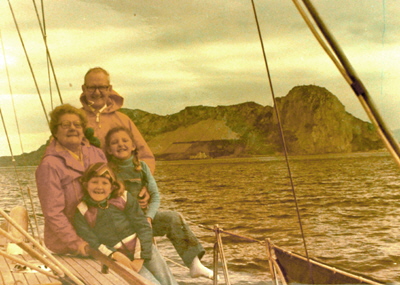 We bought a used sailing dingy and the girls quickly learned to row it, and eventually how to actually sail it on their own.
We bought a used sailing dingy and the girls quickly learned to row it, and eventually how to actually sail it on their own.
Both our parents came to visit us - or rather their grandchildren, and were amazed how they had suddenly “blossomed.” It was an awakening experience for Roger's father in particular, who had been very much against the adventure. He took his grandchildren shopping in the main street, for ice-cream - what else, and heard them jabbering to swarthy Moroccan merchants. He confessed to being totally amazed; praise indeed from an old coal-miner who was never easily impressed.
Once, when only nine, Samantha eagerly informed us she now had “A job - for money.” We were in Estepona, the nearest port in Spain to Gibraltar. She had been to a shop in the port and noticed that none of their signs were in English. “Because we not know England,” had been the reason. Many British tourists came in the shop, so not only did Samantha rewrite all their signs in English, whenever we went back to Estepona she acted as interpreter for the kindly family owners. who wanted to keep her full time as sales increased markedly when she was there, and they loved their little “Niņa Inglesa.” I have often wondered if this was the dawning of Samantha's business acumen, as she now owns a large commercial printing company with turnover in millions.
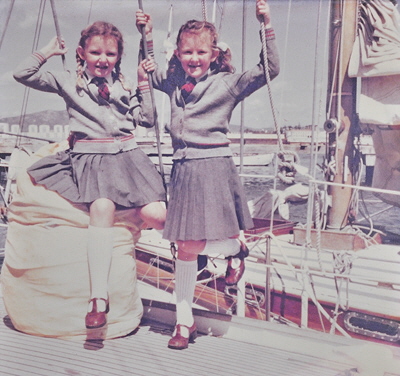 One day as I sat on the boat, a couple engaged me, lamenting that they would just love to do what we were doing but couldn't, “Because we have two school age children.” Just at that moment both girls popped up through the companionway in their school uniforms, hopped across the gang plank and disappeared down the dock to the school bus. All I could do was smile as the couple walked away.
One day as I sat on the boat, a couple engaged me, lamenting that they would just love to do what we were doing but couldn't, “Because we have two school age children.” Just at that moment both girls popped up through the companionway in their school uniforms, hopped across the gang plank and disappeared down the dock to the school bus. All I could do was smile as the couple walked away.
Every spring we set off easterly to explore all of the eastern Spanish coast and the Balearic Islands, then further afield to the South of France and beyond. Many other “yachty families” did the same and we would meet frequently, and the children would play on other boats. This gave them, and us, a periodic break from each other. It was the nautical version of a “play date.”
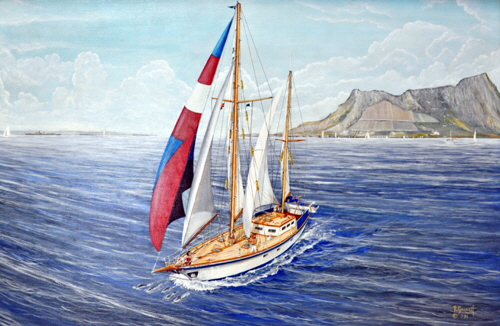 I still tried to maintain school time, every week day. We would sit in the galley and open their books where they left off then work through the next lesson whether it was English, math’s, writing or reading. The teachers in the Gibraltar school also supplemented this with continuity studies when we went away so the girls would not be behind when we returned. They also kept diaries of our travels, that they were required to read to the class when back in “real school.”
I still tried to maintain school time, every week day. We would sit in the galley and open their books where they left off then work through the next lesson whether it was English, math’s, writing or reading. The teachers in the Gibraltar school also supplemented this with continuity studies when we went away so the girls would not be behind when we returned. They also kept diaries of our travels, that they were required to read to the class when back in “real school.”
It was indeed the“vagrant gypsy life” that John Masefield talks about in “Sea Fever.” But we tried very hard not to become vagrants, keeping TB well maintained and the teak decks and varnish pristine. We involved the kids in this as much as possible and Roger taught them other skills, like varnishing, painting and woodwork, much better than “boring lessons.”
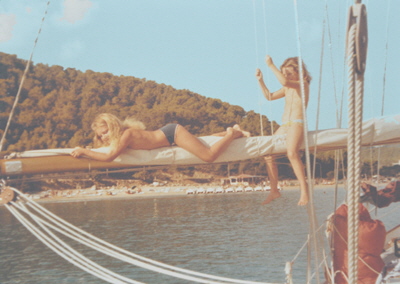 Whenever we were nearest to some historic place in the countries we visited we visited them, like the magnificent Alhambra Palace in Grenada. We sailed up the desolate river Guadalquivir to Seville, where they dressed up and took part in a real Spanish fiesta and saw the famous “Carman” bullring. In Tangiers, Morocco, they witnessed children their age begging in the streets. We visited Sintra palace in Portugal and the magnificent Cathedral in Barcelona. They even went inside the famous Casino in Monaco. It was the finest European history lesson any children could possibly have.
Whenever we were nearest to some historic place in the countries we visited we visited them, like the magnificent Alhambra Palace in Grenada. We sailed up the desolate river Guadalquivir to Seville, where they dressed up and took part in a real Spanish fiesta and saw the famous “Carman” bullring. In Tangiers, Morocco, they witnessed children their age begging in the streets. We visited Sintra palace in Portugal and the magnificent Cathedral in Barcelona. They even went inside the famous Casino in Monaco. It was the finest European history lesson any children could possibly have.
We once found ourselves in the middle of a school of whales who had come to take a look at us, some as big as TB. We were all captivated, but we were concerned they would bump the hull like I had read they might. Suddenly one ‘blew” and showered us with its warm wet breath, but the smell was awful and caused one of the girls to remark that it had “very bad breath.” I left it to Roger to explain that these animals were not fish, but had lungs and breathed air like us. “How do they manage to hold their breaths so long?” was one question we couldn't answer - where is Wikipedia when you need it? They disappeared as quickly and as quietly as they had come, yet it was sobering to all of us to realize there were bigger animals in the sea than us.
We earned money day-chartering whenever we stayed anywhere for more than a few weeks and found a niche market of people, usually tourists, who had never sailed before. It was remarkable to see our daughters take charge of children, sometimes much older than themselves, and explain how the boat worked, even how to operate the marine toilet and what they should and should not do when on board.
We flew back to England a few times when we all met old friends. Unfortunately we seemed to have little in common now and we were always pleased to get back home to our little ship.
As all parents learn, 6 and 7 year-olds soon become 12 and 13. Although I was confident they lacked nothing in the form of general education, Roger and I felt they needed a more stable environment in preparation for high school, university and adulthood.
ON THE BEACH.
It took a while for us to come to the inevitable decision, but we finally sold Tranquility Base for exactly the same as we had paid for her eight years earlier. We returned to England and have never seen or heard about our dear little floating home since. From time to time even the girls wonder where she is now. How many children who move house ever think that way?
I had worries about how they might adapt to a formal structured schooling on land, but after being interviewed by the foreboding headmistress of a posh private girls school in Stamford, Lincolnshire, both girls were accepted with scholarships. Later I asked the head why she had accepted the girls so readily? “They have such a rounded, worldly experience for children their age, I think they will become an asset to our school.” Vindication indeed. When other pupils asked them which school they went to before, they would say “boating school.” “Don’t you mean boarding school” They asked, “No, we mean boating school.” Samantha, being the more confident would often correct their British Spanish teachers pronunciation, to the point where we were asked to tell her not to - even if it was wrong.
The transition back to a land-life was not easy for Roger, who had to start a new business from scratch in the warehouse and storage equipment trade like we had before. We were living in a different town now, so he had to go out and find all new customers as well.
Some time later we re-visited Gibraltar on holiday by air, but none of our boating friends were still there, and strolling down the dock at Sheppard's Marina was not the same. There was another boat in berth number twelve, but not as nice as Tranquility Base
Our daughters continued to grow as teenagers do, and after a few years, through Roger's business connections we emigrated, (again), this time to America. To some extent this was a more difficult transition to a new life than venturing onto the boat. Sallyanne and Samantha were now 15 & 16 with friends of their own in England, and definitely with minds of their own. Initially we met fierce resistance and it took a few flights across the Atlantic to persuade them they could have much more fun in the perpetual Florida sunshine and beaches, than the dreary English weather.
We finally settled in Orlando, Florida, that was nothing like the sprawling metropolis it is now. The girls went to an excellent high school and then on to university, where they both achieved good degrees. Sallyanne went on to earn an MBA at The University of Virginia. Both now have successful businesses and children of their own. Surprisingly we rarely talk about our life on “TB.” except when our grandchildren ask, “What was it like living on a sailboat,” then gleefully listen to stories, sometimes slightly embellished and which they have even heard before, of what their mothers got up to when they were their age living on a boat.
THEN AND NOW.
All that was a long time ago, but we still do wonder if one day they may come to us and say, “Mom and Dad, we've bought a boat…” What on earth could we honestly say to that? Could we recommend anyone to sell everything and sail the seven seas with small children, especially our grandchildren? Todays cruising world is very different to “then” with advancement in communications, principally with GPS and satellite telephones it is a lot safer. Although you still can't get roadside assistance half way across Biscay.
Privacy on small boats was one of the problems all parents with kids complained about, for the children and their parents. Tranquility Base was 12’ 6”inches beam, but a modern Beneteau of the same length is 14’ feet wide. Some catamarans are floating palaces nearly twice the beam of TB, with conveniences akin to houses and unfortunately costing about as much. In such a monster there is the possibility of not actually seeing your children all day, until meal times.
Communications also greatly simplify home schooling and a laptop can contain enough lessons for a lifetime, never mind a childhood. My own has 1,000 classical books in it. The Internet also enables face-to-face chats with teachers and friends even between boats on passage, greatly mitigating the peer separation our girls sometimes felt. Everything is so much easier for live aboard cruising with children, not just because of computers and the Internet, but I-phones and digital TVs. On the boating front, water-makers, radar, AIS, Eperbs, solar panels, freezers, washing machines and roller furling sails make sailing more pleasurable, none of which we had on Tranquility Base.
As grandparents ourselves now, could we handle the same worries to which we subjected our own parents as we sailed off into the blue yonder? When will we see them again? Will they be able to handle the boat in bad weather? How will they make a living? What if there is an accident or medical emergency at sea far from land? Personally, we are hardly in any position to dissuade anybody anyway, because after a hiatus of more years than I care to remember, Roger and I now own a 50’ foot brigantine schooner. This time it does include nearly all of the above mentioned goodies. Still, some people might say, at their age they really should know better…
